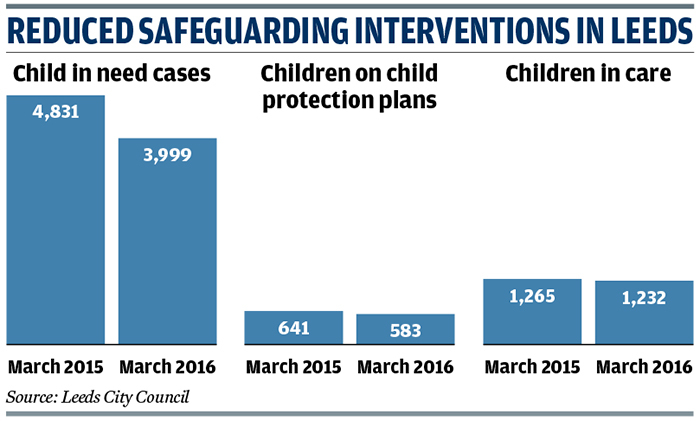How group support helps families stay together
Emily Rogers
Tuesday, December 6, 2016
Family group conferencing is enabling family members to come up with their own solutions to problems and keep children out of care.

PROJECT
Family Valued
PURPOSE
To reduce the need for children to go into care
FUNDING
£4.85m from March 2015 to March 2016, from the Department for Education's Children's Social Care Innovation programme
BACKGROUND
Leeds City Council has been developing family group conferencing (FGC) since 2010, enabling family members to resolve difficulties without the need for child protection intervention. Family Valued has enabled the expansion of FGC and the delivery of restorative practice training to more than 6,500 children's professionals.
ACTION
By March this year, 5,128 multi-agency staff had received restorative practice awareness training, helping them facilitate problem-solving among children and families before issues escalate. Meanwhile, 1,500 social workers and targeted support staff received intensive training in this field.
Leeds now has 35 FGC co-ordinators and four team managers, overseeing three area-based teams and a specialist team for early help and domestic violence. Restorative practice has focused on six high-need localities.
The council aims to routinely offer families FGC before intervening through a child protection conference, when safe and appropriate. Before Family Valued, FGCs happened when a child protection case had nearly reached care proceedings but families have since been offered them at increasingly earlier stages, sometimes as an alternative to the initial child protection conference.
"Around 10 to 15 per cent of referrals are very serious physical or sexual harm cases, which need to be worked through the current child protection system," says Saleem Tariq, deputy director of children's services. "The other 85 to 90 per cent are families struggling in conditions of adversity - things like domestic violence, substance misuse and adult mental health issues. Those families might be engaged more effectively through an FGC, where they can come up with solutions, but we'd still be there to provide support."
The FGC follows six to eight weeks of preparation, involving the co-ordinator meeting with the child's parents, extended family and friendship network, gathering information about the family's difficulties and asking relatives and friends what help they could offer.
The conference involves the co-ordinator, social worker, family members and, if safe, the child or young person. It starts with an outline of concerns, which includes the social worker outlining the non-negotiable things that must happen to keep the child safe.
Then the professionals withdraw, leaving family members to devise a "family plan" in private, before re-joining them to hear their plan and details of any support needed. The social worker assesses the plan's safety and how effectively it deals with concerns. Families come up with safe plans about 95 per cent of the time, says Tariq.
Plans are implemented with ongoing assessment and support, sometimes from third sector services commissioned with Family Valued funding. Families may be brought together after three months to review progress. Social workers can revert to the traditional child protection process if plans are unsuccessful.
OUTCOME
As of March 2015, Leeds had 4,831 open child in need cases but this had gone down to 3,999 by March this year. There was a 461 reduction in the six targeted areas.
The number of children on child protection plans in Leeds decreased from 641 in March 2015 to 583 in March 2016. A large part of the net reduction happened in the six target areas with 56 fewer children on child protection plans across those localities. The total number of looked-after children dropped from 1,265 to 1,232 over the same period. In targeted areas, the number of children in care fell by 62. However, the city's other 18 localities saw an increase of 29 children in care. The average number of children requiring social work support dropped from 559 to 463 for each of the six target areas over the 12 months.
An independent evaluation is nearing completion, led by consultancy ICF International.

If you think your project is worthy of inclusion, email supporting data to derren.hayes@markallengroup.com




